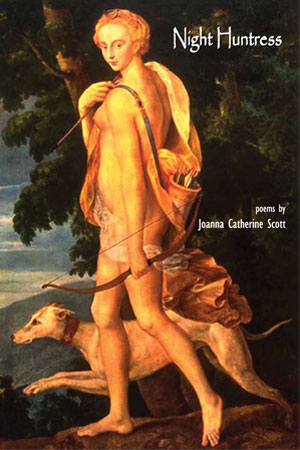Stunning. One of the finest manuscripts I’ve ever read. Compelling from beginning to end, these prose poems-each alive in heart-pulsing language-tell a story of grief, madness, agony. How is it possible, the Night Huntress asks, that the pain born of a tragic loss can culminate into a peace that passes understanding? Read this collection, and you will know that you are in the hands of a masterful writer whose prose poems are so lyrically controlled you won’t want to miss a single step, image, metaphor. Scott spins various points of view into a journey-a mystery of the heart so profound you will feel transported into myth and parable.
–Irene Blair Honeycutt, Waiting for the Trout to Speak
I wept over this book. Every one of us has known a young man or woman who has gone out and got drunk and killed themselves. In telling the story of one, Night Huntress speaks for all. And yet there is no preaching or hyperbole. The story is told simply, in language so controlled and elegant that a brutal misadventure becomes transformed into a thing of melancholic beauty. A shocking but at the same time a comforting and healing book.
—Tony Abbott
Scott succeeds in giving us not just an evening’s disaster, but the story of an entire family and the rings of joy and sorrow that surround it. Starting with what is, in fact, a compressed novel told in the heightened language of poetry, she expands outwards into a series of meditations on grief and healing, ending with the lovely benedictory “In the Dawn Valley,” the title itself evoking a new beginning.
—Roy Jacobstein
HOW THEY INSIST
It is good, this quiet, this getting away to sit by a pond with a small waterfall and a frog squatted on a rock beside it, early sunlight flashing off the wings of dragonflies. It is good, after everything, after the funeral, with its eulogies and weeping, and the terrifying silence of the mother looking down into the grave, not to think about my daughter’s voice, taut and trembling on the phone. ‘There was nothing left,’ she says, ‘just a leg, nothing else was left of her, the leg with the scar, the one she got playing soccer. Remember, Mother, how that big girl kicked her in the leg?’ Her voice is high and breaking. I do not know how to comfort her. ‘She’d been drinking,’ my daughter says, ‘and now there’s nothing left of her. He is in the hospital. He’s all smashed up and they haven’t told him yet. They don’t know if he’ll live and his father is beside himself. Remember his father, the one who runs the sports store and the summer soccer camp?’
She did not say if the boy had been drinking too. I did not ask, and now it does not seem to matter. Either he will live or he will not live. If he lives, he will either blame the girl or he will blame himself, or else he will become a saint, and carefully, watchfully, for the rest of his careful, watchful, sainted life, he will blame no one. On the other hand, he may do none of this, either blame or not blame, because when his head was smashed, and his ear ripped off, and all the beautiful expensive orthodontics of his perfect American smile smashed along with his jaw, something happened to his brain.
At first, when they had wired his jaw up and he came out of the anaesthetic, he could talk a little, although he was hard to understand. ‘Is she okay?’ he whispered and called what seemed to be her name, and when no one answered, closed his eyes, lids moving, body tensing, as though remembering her laughter and his fizzing blood, the wild exuberant rushing of the wind against the car, and then the swerve – oh, the swerve! – the extraordinary quiet beauty of the woods, the trees dripping above him.
An hour went by before he spoke again. ‘Squirrel,’ he said, squirrel in the morning,’ as if he saw again the way it crept along a branch, and head first, tail twitching, scuttled down the trunk and looked at him, sharply, almost critically, in that way of squirrels, as though it had seen such foolishness before and did not know what to make of it. Then it scuttled off again, around the back of the trunk and up into the branches.
It did not know how to call an ambulance. It knew nothing about ambulances, or even about creatures like this one sprawled below it in the undergrowth, how they will, how they insist it seems, generation after generation, before they are fully grown, when they are right there on the cusp, right there between the pupa and the full-blown moth, right there, poised in metamorphosis, with no thought of what has come before, who has done it, no thought of all the flower-decked crosses up and down the roads, give in to some compulsion from another world, a world that wants them now, this minute, just the way they are, teetered on the brink of opening. Although they do not understand this, do not, for the moment it takes, think, perhaps, of anything.
An ambulance came anyway. Somebody came by, another driver in another car, and almost ran into the wreckage on the road, the split car, not a car at all, the broken carapace. It was not till later that they found the other half. It could not be seen from the road, or even from where the boy lay with his smashed jaw and his smashed spine and his smashed legs and ribs. Everything was smashed, his brain too, up against the inside of his skull, the way the girl had been smashed up against the inside of the car, or what remained of it, not much, a closed fist of a car, or half a car, since the other half had ripped off and wheeled around, tossing the boy out as it charged back onto the road, as if it wanted to begin again, to take up at the point where everything went wrong and do it right.
Of course it couldn’t. It just lay there on the road and groaned, while the thing behind it in the undergrowth, the thing that had been part of it, the thing that suddenly, without anyone expecting it, with everyone expecting it to roll back meekly up the drive, for its door to open, quietly, since it was late at night, and then to close, had, in the darkness – it was very dark where all this happened – turned into a monster clinging like a lover to a tree trunk in the woods. All night it clung, and early in the morning the squirrel came and looked down at the boy, and then the driver came by, heading down the road to work, and then, of course, the ambulance, the fire department, the police, reporters in their news van with coffee on their breaths.
They identified the girl by the scar on her leg. There was nothing else to identify. And the boy has fluid on the brain this morning, so he may, mercifully, like a gift, like the chrysalis he was, and has now become swathed head to foot in bandages, a limp and bloody thing of broken bones and ragged edges of bones, break forth transformed, not into what he was, whole-boned and beautiful and foolish, in the way a beautiful young man convinced of his invincibility is foolish, but into something never seen before, or only dreamed of (I want, I have, to think of him like this) a shining creature, hovering and boneless, singing in the light.
THE BOY AT THE NIGHTCLUB
The boy at the nightclub does not remember. He had been drinking, he says, and cannot swear the girl in the back seat of the convertible was real.
Pressed, he is certain she was there, her blond head glistening in the artificial light.
But he does not remember her inside the nightclub, or in the parking lot, although he remembers he came out to be sick.
He does not remember her opening the car door, or climbing in, although, he says, and there is fear in his eyes, she was there, she was there.
He recalls the color of her hair, how its blondness had a green cast, how it flowed around her as the car shot off, like seaweed, he says, like something swaying underwater, something tossed about and eddied by a violent current.
He has seen such things, he says, because he is a diver, had been out that very day, was caught in a rip, and, frightened, came home to have a drink.
That is how he puts it, although when he had drunk one, he drank another, and another, until the girl appeared, her skin luminous as shallow water underneath the street light and her pale hair swept about.
She turned to him, he says, and beckoned, although he cannot remember her face, he was too busy being sick.
He is weeping, and the two policemen asking him questions look at each other over his bent head, shrugging slightly, telling each other he is no good as a witness, that he was having visions, telling him sternly he was lucky not to have gone with her, lucky to have fallen face-down in an ocean of his own creation, floated until morning amongst brightly colored fishes hot as blood.


 Joanna Catherine Scott
Joanna Catherine Scott
Reviews
There are no reviews yet.